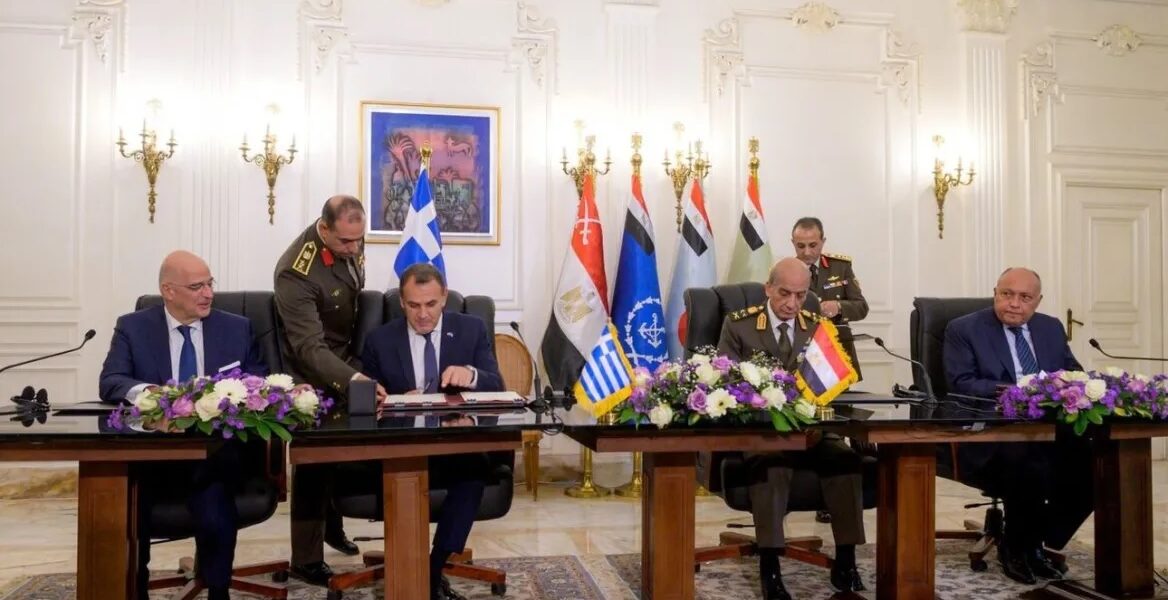While they celebrate in Turkey the recent handshake in Qatar between President Recep Tayyip Erdoğan and his Egyptian counterpart Abdel Fattah al-Sisi, and interpret it as a sign of rewarming bilateral relations, Athens and Cairo are taking another step in cooperation aimed at security and stability in the Eastern Mediterranean region.
The signing of the interstate agreement for joint search and rescue operations (SAR) further shields Greece’s borders and follows a series of diplomatic agreements, the most important of which was the one in 2020 regarding the delimitation of an Exclusive Economic Zone with Egypt.
The new agreement provides for: Determination of Search and Rescue (SAR) limits and identification of the Flight Information Region (FIR), ie the area where the two countries control the flights and SAR. In addition, it provides for the joint SAR operations joint search and rescue operations.
The new agreement with Egypt cancels – again – the illegal Turkish-Libyan memorandum and is a significant blow to the narrative of the “Blue Homeland”.
It also responds to Turkey’s unilateral and arbitrary expansion, a year ago, of of its own search and rescue area, up to the 26th parallel, occupying a significant part of the Greek FIR both in the Aegean and in the Mediterranean.
“Our actions are based on international rules. We never and in any way try to encroach on the sovereignty or sovereign rights of other states, unlike others in the region,” stressed Greek Foreign Minister Nikos Dendias, after the meeting he had on Tuesday in Cairo with his Egyptian counterpart Sameh Shoukry.
He pointed out that the goal of Greece and Egypt with this agreement is to create a cooperation framework that will contribute to saving precious human lives.
Our country has signed similar SAR agreements with Italy (2000), Malta (2008), and Cyprus (2014).
Reacting to the signing of the new agreement, without however naming Greece and Egypt, the Turkish Minister of Defence Hulusi Akar explained that Turkey will not allow Cyprus, the Aegean and the Eastern Mediterranean.
According to the Turkish news agency Anadolu, the Turkish official claimed, at the same time, that Ankara is “open to dialogue”.
Turkish pro-government media continue to promote yesterday’s today’s ministerial mission in Cairo, consisting of the ministers of foreign affairs and national defense Nikos Dendia and Nikos Panagiotopoulosas, as well as Deputy Foreign Minister Miltiadis Varvitsiotis, as Athens’ reaction to the recent Erdoğan-Sisi handshake in Doha, Qatar, following the “urge” of Qatar’s Emir Tamim bin Hamad Al Thani.
The reports speak of a “melting” of the ice between Turkey and Egypt, although until recently Erdoğan called Sisi a “murderer” and a “dictator”.
“Great panic in Athens. They quickly put the ministers into action,” writes the Milliyet newspaper, commenting that the Erdoğan-Sisi handshake constitutes: “a new beginning in bilateral relations.”
“Something that caused panic in Greece, the spoiled child of Europe,” writes the newspaper, leading to the “hasty” visit of Greek officials to Cairo, despite it having been planned for a long time.
“Greece’s futile attempt to erase Turkey’s achievements,” said the Sabah newspaper, reporting that Greece in recent weeks – and after the signing of new agreements by Ankara with the deposed government of Libya – the tension between the two countries has increase, with Athens aiming to cancel them.
In this context, according to the publication, yesterday’s visit of Greek officials to Egypt is included.
READ MORE: Turkish analyst: Our mini “aircraft carrier” is useless in the Aegean.


